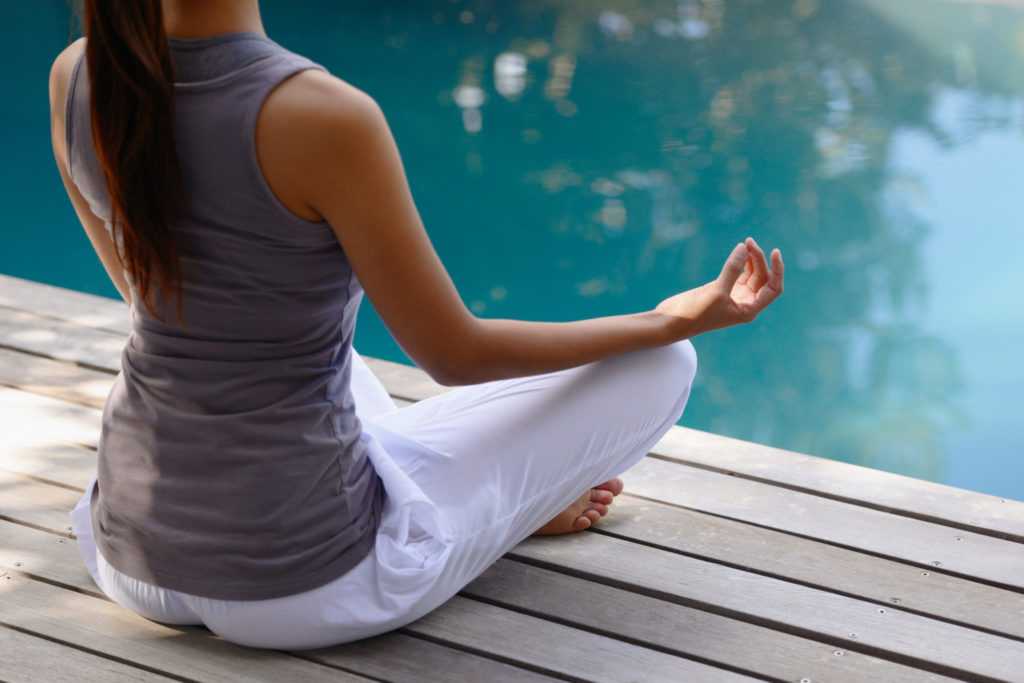Work stress, home stress, family stress, money stress—they can all add up to a whole lot of pressure. The ability to recognize and respond to stress is a crucial skill for everyone to learn, especially because stress is tied to many conditions that can harm our health. Psychological stress occurs when the world’s demands tax or exceed our ability to adapt to those demands.[i] Our bodies then release hormones (including cortisol and adrenaline) that can mimic a real attack. It is these compounds that can impact our health in (sometimes) serious ways.[ii]
Stress affects the brain and can lead to feeling sad and burned out, but it can also impact heart[iii] and digestive health.[iv] The good news is that relaxation is a skill that can be learned.
Here are some of the best ways to help get stress under control:
Breathe: Because you can control your breath, it is one of the best ways to make changes to your body. You breathe fast when you are nervous and more slowly when you are relaxed. It also works the other way: you can tell your body that you are relaxed by consciously slowing your breathing. Slow breathing can work in the moment but is much better if you practice every day.
Relax: When you are feeling stressed, there is nothing worse than hearing “just relax.” But relaxation, and especially progressive relaxation, is a great technique to learn. Progressive relaxation is easy: you start at your toes and relax each muscle as you slowly move up your body. Pay attention to the way you hold your body and where you feel most tense . Letting go of those tense areas can help you feel relaxed.
Be mindful: Mindfulness can be defined as a state of active and open attention on the present. Mindfulness is simply paying attention to what is around you in the present moment. The scientific community has become enamored of mindfulness, and there are multiple studies using this technique in many different populations (from children to older adults) and for many different conditions (from work/school performance to heart, digestive, and other conditions).[v]
Exercise: Your body needs exercise as much as it needs food, water, and light. Exercise, especially intense exercise, has a way of bringing a sense of calm to your day, and its effects last for days.[vi] Exercise today to help you with a stressful situation tomorrow.
Trigger awareness: What causes you to go into overload is unique; we all have our triggers. Most of us know we are becoming stressed well before it happens. Trigger awareness is one of the most important skills to learn for stress reduction. When you learn what your early warning signs are, that is when you can start your relaxation techniques (or go for a run or walk).
Stress relief works. People who practice these techniques have been shown to lower their blood pressure, reduce stress hormones, increase blood flow, feel energized, boost confidence, and have better concentration and mood. It is well worth your effort to learn some (or all) of these techniques to handle stress.
But to get the most benefit from these techniques, you must practice. Stress reduction is a set of skills that you get better at with time. The list above is not exhaustive. Other techniques may work for you: Go get a massage, spend time in nature, dance to your favorite music, take a warm bath, play with your children or pets.
Start small. Start today. Don’t wait for an especially stressful time in your life to start practicing stress reduction.
[i] Cohen S, Janicki-Deverts D, Miller GE. Psychological stress and disease. JAMA. 2007 Oct 10;298(14):1685-7.
[ii] Ranabir S, Reetu K. Stress and hormones. Indian Journal of Endocrinology and Metabolism. 2011 Jan 1;15(1):18.
[iii] Dimsdale JE. Psychological stress and cardiovascular disease. Journal of the American College of Cardiology. 2008 Apr 1;51(13):1237-46.
[iv] Mayer EA. The neurobiology of stress and gastrointestinal disease. Gut. 2000 Dec 1;47(6):861-9.
[v] Brown KW, Ryan RM. The benefits of being present: mindfulness and its role in psychological well-being. Journal of personality and social psychology. 2003 Apr;84(4):822.
[vi] Deslandes A, Moraes H, Ferreira C, Veiga H, Silveira H, Mouta R, Pompeu FA, Coutinho ES, Laks J. Exercise and mental health: many reasons to move. Neuropsychobiology. 2009 Jun 10;59(4):191-8.
For more healthy lifestyle tips, Subscribe Now to Naturally.






